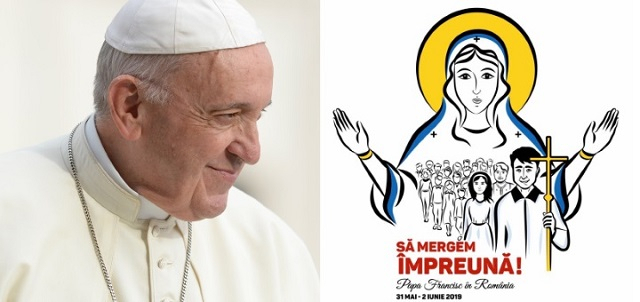The significance of the visit Pope Francis paid to Romania
20 years since the first visit of a Sovereign Pontiff to an Orthodox majority country, the head of the Catholic Church, Pope Francis paid a visit to Romania

România Internațional, 16.08.2019, 12:13
20 years
since the first visit of a Sovereign Pontiff to an Orthodox majority country,
the head of the Catholic Church, Pope Francis paid a visit to Romania, which was
under the sign of the unity of all Christians. The first moments of the visit
had a diplomatic touch, the Sovereign Pontiff speaking about the fraternity of
blood equally claimed by Catholicism and Orthodoxy:
The
bonds of faith which unite us date back to the Apostles, witnesses of the risen
Jesus, particularly to the bond that united Peter and Andrew, who according to
tradition, brought Christianity to your lands. Blood brothers, they were also
in an exceptional way brothers in shedding their blood for the Lord. They
remind us there is a fraternity of blood which precedes us and which as a
silent and life-givng stream flowing down the centuries has never ceased to
nourish and sustain us on our journey.
On the other
hand, Pope Francis noted the progress which Romania has made in the last 30
years when it has committed itself to a democratic project, despite numerous
difficulties and shortcomings it has been confronted with. The symbolic
significance of the Pope’s visit to Romania consists in what he defined as the
human price paid by Romania to step into the 21st century – the
diaspora and the role of the church in serving the whole community – theologian
and priest Radu Preda told Radio Romania International:
It
is clear that as regards the social and ethical message, there is a very wide
range of contact and even of identification of values between Orthodox and
Catholic Christians. The Pope is not only a vector of image of a single person,
but also the synthesis of history where surely, there are also less pleasant
moments related at least to us, Orthodox believers. But all in all, in the
current international circumstances, it is clear that we need a bigger
Christian solidarity than we have proved to have so far. The Pope underscored
the human price we pay for Romania to reach the 21st century. Millions
of co-nationals, our brothers and sisters, as he put it so well, left their
country where unfortunately, they could not see their dream come true, adding
more value in other countries, primarily in Italy. Let’s not forget that the
Romanian community in Italy, if I am not mistaken, is the largest one, followed
by the one in Spain and if I am not mistaken by the one in Germany. So,
emphasis is laid on the diaspora.
Pope Francis
paid hommage to the sacrifice made by the sons and daughters of Romania, who
through their culture, their values and work, enrich the countries where they
emigrated and who through the fruit of their work help their families back
home. Unlike the pastoral visit which Pope John Paul the 2nd paid to
Romania in 1999 and which had a predominantly ecumenical focus, also
benefitting from the invitation of the Romanian Orthodox Church, in addition to
that of the state officials, Pope Francis came to Romania at the invitation of
its president and of the Catholic Church in Romania. Through liturgical
celebrations, his visit had a pastoral character being first of all focused on
Catholic believers. There were a few firsts in the apostolic visit by Pope
Francis to Romania: it lasted three days, which had never happened in any other
European country, the Pope equally visiting Catholic Christians in their
linguistic and liturgical diversity and the Orthodox Christians. The last day
of the Pope’s visit, focusing on the Greek-Catholic Church, had a special
symbolic touch. On the Freedom Plain in the central town of Blaj, the Pope
beatified seven Greek-Catholic bishops, martyred by the former communist
regime, who were jailed and tortured and who died of maltreatment, opposing a
system that repressed basic human rights as the Sovereign Pontiff recalled.
Wilhelm Danca, the dean of the Roman-Catholic Faculty of Theology in Bucharest,
spoke about the Pope’s visit to Romania:
In the
Balkan area, I find this meeting very important. North of Romania, in Ukraine,
there are fractures, division and separation within the Orthodox Church,
tendencies of breaking and fragmentation of Christian unity. There are two or
even three churches there: one is related to Moscow, another one to
Constantinople and the last one is autonomous. In the Republic of Moldova there
are two communities: a metropolitan bishopric which is related to Moscow and
another one related to Bucharest. South of Romania, in Bulgaria, the Orthodox
Church is related to Moscow, not to Constantinople. The church in the Republic
of North Macedonia broke away from Serbia and wants to join the Orthodox Church
in Bulgaria. You see, these are tendencies of relocation, of separation, of
unification and the only church conveying a message of unity, somehow as a
unitary church, is the Romanian Orthodox Church.
I came to
this beautiful and welcoming country as a pilgrim and brother for various
meetings. And now I go back home enriched, taking with me places and moments
and especially faces. Your faces will lend colour to my memories and will be
present in my prayer. Thank you and I’ll take you with me. And now I’m blessing
you but first of all I want to ask you a great favour: pray for me! – the
Sovereign Pontiff said at the end of his visit to Romania.






























